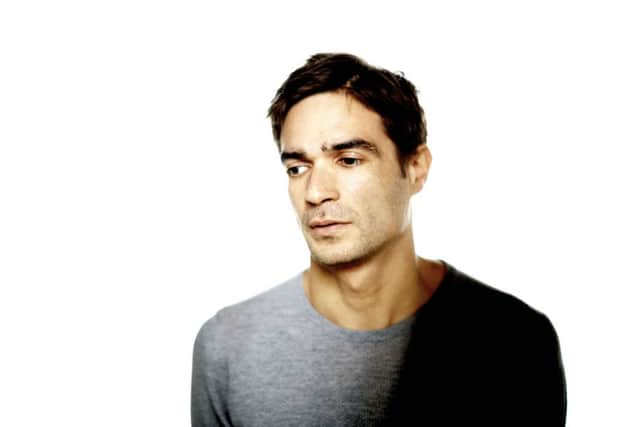Jon Hopkins: ‘Accessibility is important’


Nine months later, the 39-year-old still sounds as surprised by the turn of events. “I think it would be unwise to expect things to go as well as you’d hoped,” he says. “I’d had several albums out before and they’d progressed and helped me learn to do what I was doing and got me some experience but that was the one that really broke out.
“I think to assume it’s going to happen more and more each time is dangerous because you don’t know what people are going to be into, you don’t know if anyone’s going to care about the genre or have the patience to listen to such long tracks. I was very pleasantly surprised, particularly as it was written with more of my personal essence than anything else I’ve done. It was very nice to have that be the one that does the most.”
Advertisement
Hide AdAdvertisement
Hide AdPerhaps key to the album’s success is the way sounds morph from one thing to another. In the track Neon Pattern Drum a rhythm subtly emerges from a wash of electronic noises. “I love the idea of rhythms seeming to grow out of non-rhythm,” Hopkins says. “There’s a big wedge of sound at the beginning of that track and it seems to break up into something which seems pretty abstract but as soon as you put a bass drum under it you realise it’s something quite understandable. It’s messing with the head of the listener, which I like doing. It keeps people guessing and it adds to that trance-like effect which I’m trying to get.


“I think if the rhythm or the pattern is too predictable, it comes in a traditional way, you get it straight away and you tune out a little bit and then you’re like ‘OK, 16 bars of that and then it moves on’. I really like to mess with those ideas, so I would say there’s experimentalism in there, in a lot of places it’s less obvious, it’s in there for people that want to listen deeply, but at the same time accessibility is important because that’s kind of my taste, I grew listening to not just electronic stuff but pop stuff as well. And I like to play to bigger crowds and have a nice shared experience, a lot of people want that more than an imperishable electronic experiment. It’s trying to straddle those two things.”
Feel First Life gradually becomes a wordless yet poignant choral piece. For Hopkins, having human elements among the machine music was important. “Choral music has always been a fascination,” he says. “I was in the choir at my school [in Wimbledon] and did enjoy it then even though it wasn’t really a choice to be in it, you just get kind of pushed in. But I do remember being in some incredible cathedrals in France and getting familiar with John Taverner. Then I became very interested in Thomas Tallis and quite a lot of other amazing choral composers over the years, the Hillyard Ensemble’s stuff with the medieval quartet work, I find all that stuff really beautiful. Those were my basic references with that section, and then I thought wouldn’t it be interesting for that to grow out of something else, not just come in as a choir because frankly that would have been pretty out of place in a 12-minute techno track. That piano section bridges the thing and I processed it so that that choir really seems to grow out of something that’s part of the track, there’s an echo-y drone under it that is actually a processed version of the male voices in the choir and then by the end of it it’s pretty much an unprocessed group of voices. Hopefully that has a striking rawness to it, it shines a light on the complexity of some of the other sections, really.”
That love of complexity applies across Singularity. Even in its most dancefloor-friendly track, a 10-minute epic called Everything Connected, the beat gradually disintegrates. Hopkins says his aim with the whole album was to encapsulate a psychedelic experience. “A defining word of the psychedelic experience is ineffability and therefore you can’t describe it in words and you can’t really describe it in music but you can start to hint at it and if you have those experiences they will be translated into music, whether you like it or not. There aren’t really words to describe the visions particularly that cane come to summing up the power and the majesty of it. That particular track ties in with club world a bit, which I see as a distinct thing from the psychedelic ceremony, but that middle section certainly would hopefully get the heart racing in whatever state you’re in.”
Advertisement
Hide AdAdvertisement
Hide AdHopkins says he doesn’t have images or a storyline in mind while he’s composing. “It’s in there somewhere, let’s put it that way, but not on any conscious level,” he says. “I used to think that would be the way I would write and then you start something and everything you’d planned sounds really dry and boring and you end up destroying it essentially sonically, eroding it or mangling it and coming up with something that you wouldn’t have thought of without being in the studio and hearing things.”
Dotted in between Hopkins’ five solo albums have been a number of collaborative projects with the likes of King Creosote and David Holmes and soundtracks for films such as How I Live Now. “I do enjoy it, it’s certainly a lot easier,” he says of his fondness for collaboration. “I didn’t actually do anything else while I was working on Singularity but certainly all the other albums I was actually combining those projects with film scores or collaborations. When you’re doing a film score you have a story already and you’re just supporting it. It’s a lot easier than having to essentially write the whole story yourself but in the abstract medium of incidental music and you’re having to design all the characters, every single scene comes to you, whereas with scoring it’s like part of the set design in a way, maybe more than that you can help tell the story and add emotional gravitas but then it’s a part of a bigger whole.
“Then in collaboration, if you take that King Creosote record [Diamond Mine, which was nominated for the Mercury Prize in 2011], it was actually the easiest thing I’d ever done because Kenny [Anderson]’s song writing was so immaculate and the vocals were so perfect, it was very easy for me to produce things around that. They just fall in place when you have that much of the main information already present.”
Hopkins has also collaborated with Brian Eno several times, including the 2010 album Small Craft on a Milk Sea. “He’s an unusual man,” he notes. “He’s very funny and brought a certain lightness to proceedings. I think he got me out of my head a little bit. He’s obviously capable of being an incredibly cerebral man but when it comes to music-making he’s pretty much a man who works on instincts, he will purposely generate accidents within the music by picking chords and sounds at random; I think a lot of my faith in accidents and the overall flow probably came from him.”
Advertisement
Hide AdAdvertisement
Hide AdWhen in 2008 Eno produced Coldplay’s album Viva La Vida Or Death And All His Friends, Hopkins joined in too. His instrumental track Light Through The Veins was sampled in the Coldplay songs Life in Technicolor and The Escapist. Viva La Vida’s multi-million selling success helped in terms of recognition “in the world of producers”, Hopkins acknowledges. “It didn’t have an effect on my artistry because I hadn’t even signed to Domino at the point and it wasn’t followed by a record that it would immediately tie into. In fact Insides, which was the album that came after it, was my most difficult album, it had some weird stuff in there which is very incongruous with what I was doing with Coldplay, but within mainstream music I’m sure it would have led to more credibility and people having confidence maybe to get me to work on other things.
“It was an amazing experience and I think it’s a brilliant record, it’s my favourite record of theirs and that’s not saying that because it had my involvement, I just think it’s a truly interesting and varied and beautiful album. It’s strange in such a brilliant way. I felt like they were at this point where they had world domination but they had done X and Y which was not their most enjoyable to make and not their favourite. To accept that they needed to approach things from a more experimental angle and yet still maintain that ability to fill stadiums with great songs, I think it was an amazing achievement doing both of those things with Viva.”
Among the other projects that Hopkins has in the pipeline is a sound installation to accompany an exhibition of photographs taken on a caving trip last year in Ecuador – “I have captured some sounds down there which are pretty magical,” he says, “I have this singing bowl which I use in meditation and I recorded some sounds on that before I left and then played them back through a speaker down in the cave and captured the sounds from 50 metres away with various different microphones, and I have lots of field recordings from the area as well, that could turn into something really interesting at some point, for sure.”
He also plans a concert hall tour. “I did study classical piano at one point but I don’t see it relating to that,” he says. “Just because there’s acoustic piano involved it doesn’t for me mean classical; it’s more in line with my film score stuff and just the fact that I am a pianist originally.
Advertisement
Hide AdAdvertisement
Hide Ad“It’s to do with being 40 this year. I don’t want to keep playing in clubs. When I play the live show as it is at the moment I really enjoy it but it’s a very energetic, beat-led thing and I don’t want to only do that, I don’t want to only play to people that want to come out at midnight and dance and get messy.
“I did [piano concerts] at little bit before, at the Royal Festival Hall and Brighton Dome and a concert hall in Berlin as well with Nils Frahm, for [his 2013 album] Immunity and just those three told me I wanted to do a bit more. It’s a really different experience. People will get out of their seats and dance and that’s great, but also they’ll sit down for the quiet bits, and I can have other musicians as well, string players and guitarists. These things tend to be a bit lost within the festival circuit, which I’ll be doing a lot of this summer, so it’ll be a nice contrast to that.”
Jon Hopkins plays at O2 Academy Leeds on March 1. www.jonhopkins.co.uk